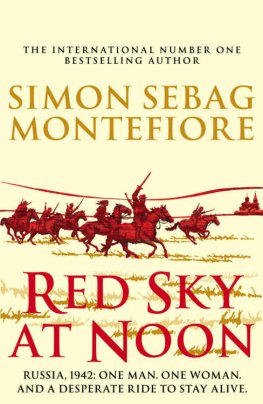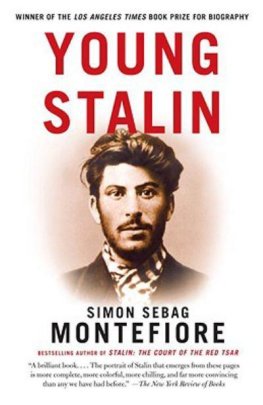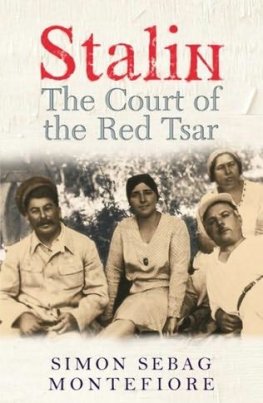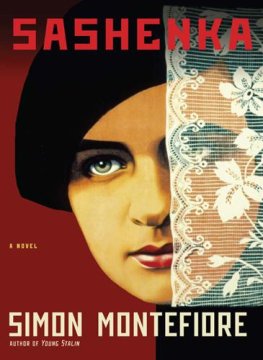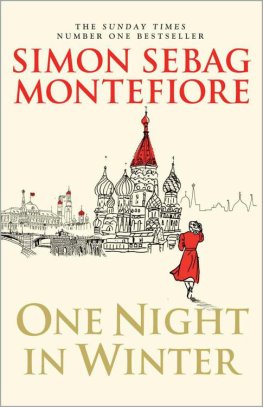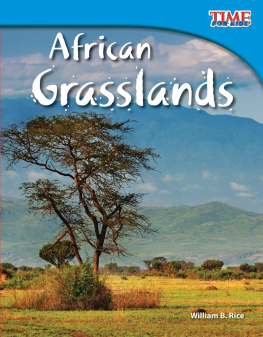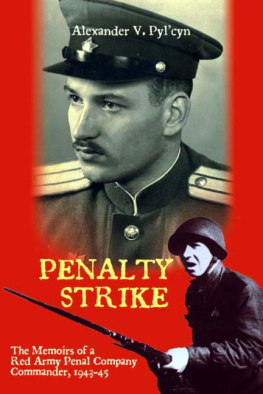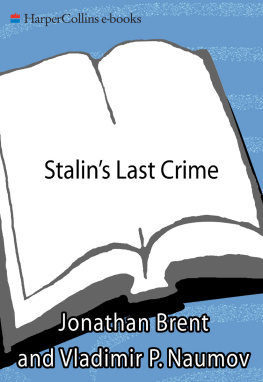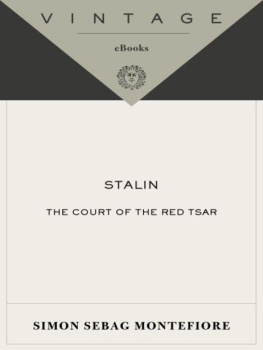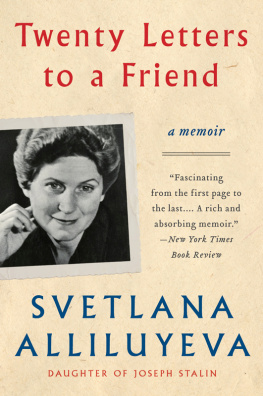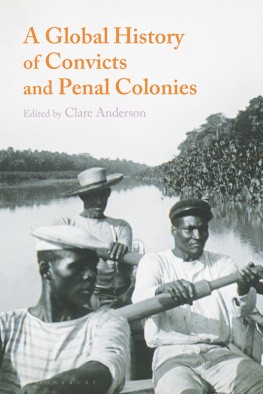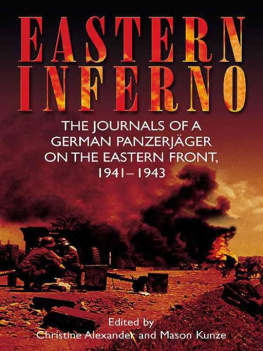Simon Sebag Montefiore
RED SKY AT NOON
My name is Nothing, my surname is Nobody.
Saying of Gulag prisoners
Order 227
It is time to finish retreating. Not one step back! Panic-mongers and cowards must be exterminated on the spot These are the orders of our Motherland Military councils of the fronts and front commanders should: Form within each front one to three penal battalions (800 persons) where officers and soldiers who have been guilty of a breach of discipline due to cowardice or panic will be assigned, and placed at the most difficult sectors of the front to give them an opportunity to redeem their sins by blood
Josef Stalin, Peoples Commissar of Defence Moscow, 28 July 1942
A Cossack rode to a distant land;
Riding his horse over the steppe.
His home village he left forever.
Hell never come back again.
Cossack song


On 22 June 1941, Adolf Hitler launched Operation Barbarossa, his invasion of the Soviet Union, which was ruled by its dictator Josef Stalin. It was to be the most savage war of annihilation ever fought. Taken totally by surprise, the Russians lost vast numbers of men, tanks, planes and territory in the early months as the Germans fought their way towards Moscow. By September, even the capital was in peril. But Stalin counter-attacked and the Germans were thrown back.
Early in 1942, Hitler planned a new knockout blow. Stalin expected another attack on Moscow but instead Hitler launched Case Blue, an offensive across Ukraine, and then the vast flat grasslands of southern Russia, towards the Don and Volga Rivers, and southwards to seize the oil fields of the Caucasus. The Nazis were aided by their allies: the Italian Fascist dictator, Benito Mussolini, sent an army of 235,000 Italians to help in the assault. Both sides were short of tanks so, for a short time, they fielded cavalry instead. These battles would see the last great cavalry charges in history.
That summer, Soviet forces collapsed and tens of thousands of soldiers were surrounded or surrendered while hosts of Russian or Cossack anti-Communists turned traitor and collaborated with the Nazis. The German offensive was so successful that it soon appeared as if Russia would be cut in half. The Germans were also advancing across North Africa. If they broke into the Caucasus, there was a real danger they could link up with their forces in the Middle East and the war would be lost. Hitler smelled victory; Stalin was close to panic. This was the most dangerous crisis in World War II.
Soon the mighty Don River was all that stood between defeat and survival. Beyond the Don was a city on the Volga River, now known as Stalin City.
Stalingrad.
This was the desperate, uncertain moment that the characters in this novel joined the war
The red earth was already baking and the sun was just rising when they mounted their horses and rode across the grasslands towards a horizon that was on fire. There are times in a life when you live breath by breath, jolt by jolt, looking neither forward nor backwards, living with a peculiar intensity, and this was one of those times.
They had come out of the clump of poplar trees where they had spent the night, sleeping on their horse blankets, their heads on their saddlebags, fingers curled around their pistols, saddles and rifles lying beside them. Their horses stood over them, soft muzzles savouring the air, their deep brown eyes watching their masters whom they knew so well.
The captain awoke them one by one. They saddled the horses, tightening the girths under their bellies, inspecting hooves and fetlocks, stroking withers or neck, talking to them in soft voices. The horses tossed their heads at the horseflies that tormented them, their chests shivering, tails swishing, rolling their eyes at what lay just beyond the trees.
The horsemen scanned the plains fretfully, each knowing that their future was as ominous as the land was boundless. Their struggle under the burning sun made no sense they were hunted as well as hunters yet their thoughts were not hopeless, not at all, for each of them had known hopelessness before, and this was far better. Here they could be redeemed by the blood of their mission: they believed this with a baleful conviction, and for some of them it was the first decent thing they had ever done
They turned to their horses, whom they loved above all things, giving them some fodder and hay that they carried in a net on the saddles. The horses needed calming, but the grooming, the loving care, the routine of so many mornings, reassured the animals.
The swab of sun had turned the sky a pinkened yellow yet the horizon behind them was jet black with a slow-billowing plume of smoke so solid in appearance that it resembled the domes of a dark cathedral. In the distance the crumps of explosions were deep yet they ignored them. It was already hot, burning hot, and there were jewel-drops of sweat on every mans nose and upper lip. There was a wind but it too was burning, a swirl of blackened straws of stubble and the chaff of wheat. The grass had turned blond with the slanting golden rays of invincible summer.
Pantaleimon, the oldest of the band, extinguished the nights campfire, treading the ashes into the earth, and packed the coffee pot into his saddlebags, which were a sort of Aladdins Cave of food and tools and supplies. Never throw anything away, he would say. Everything has its moment, brother, everythings useful in the end.
The Cossacks called each other brother just like the Communist Party members called each other comrade. Pantaleimon, always known as Panka, pressed Benya Golden on the shoulder. Be cheerful, Golden, he said. Its always sunny on the steppe. Then they checked the sabres were in their scabbards, the guns over their shoulders, the zinc ammunition boxes packed into the leather pouches, the dried meat, bread and sugar and rolled-up horse blankets in the bags behind the saddles. They had left nothing behind nothing, that is, except the body that lay down the slope from them, with the blood blackening like a ridge of tar on its throat. Benya glanced at it but only for a moment; he had become accustomed to the dead.
I dont think hes going to miss us, do you? said Mametka in his high-pitched voice. He was tiny he claimed to be five foot with the rosebud lips of a faun and a voice so girlish and eyes so childishly tameless that the Criminals in the Camps had nicknamed him Bette Davis.
They were lost behind enemy lines and Benya Golden sometimes felt they were the last men left alive in the world. But their little squad wasnt a typical Red Army unit. These were sentenced men, and the rest of the army called them the Smertniki, the Dead Ones. Yet these men would never die in Benyas mind. Later, he found they were always with him, lifelike, in his dreams just as they were that day. Some had been in prison for murder or bank robbery, some for stealing a husk of a maize, many merely for the misfortune of being surrounded by German forces. Only he, Benya, was a Political and this meant he had to be even more careful: My name is Nothing, my surname is Nobody, was his motto. This discretion had once been a challenge for him; now they were all beyond the control of the Organs or even the military.
It was July 1942 and the Red Army was falling apart, Stalins Russia was on the verge of destruction, and the distrust and paranoia of the Camps still gnawed at each of them. Having broken through enemy lines at a terrible cost, adrift on the endless blond sea of the grasslands, they had one more mission to pull off.

